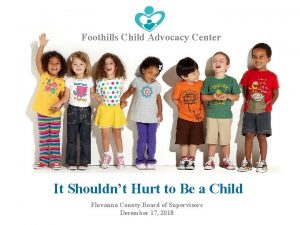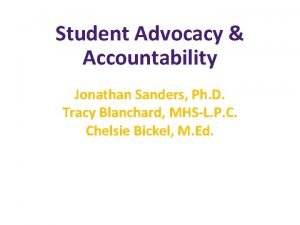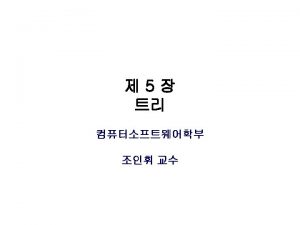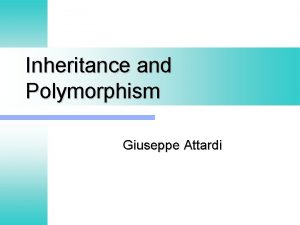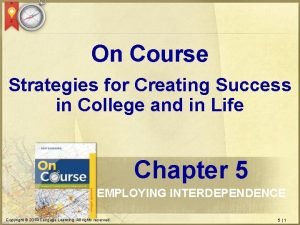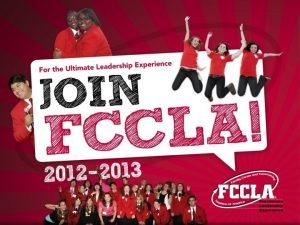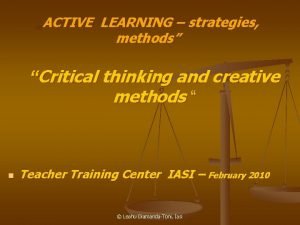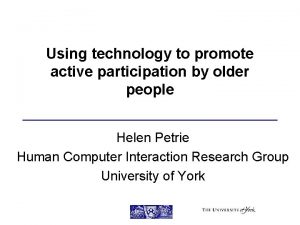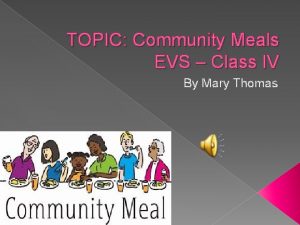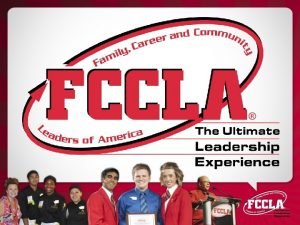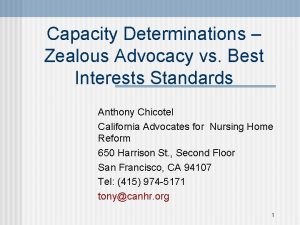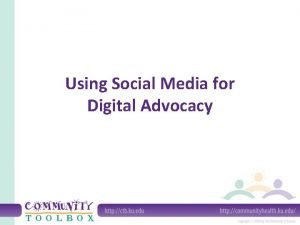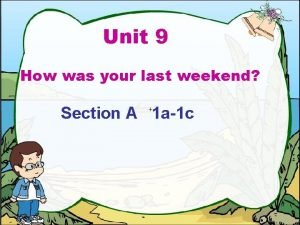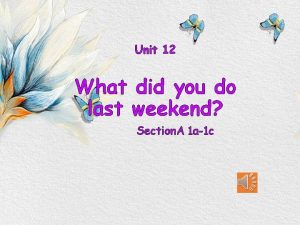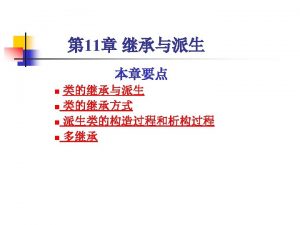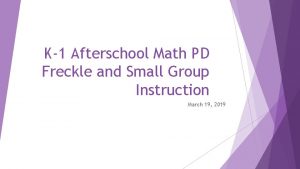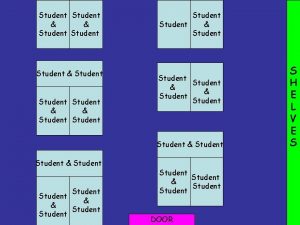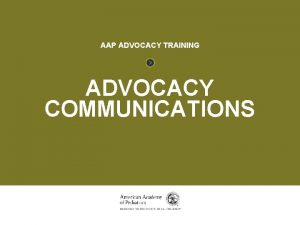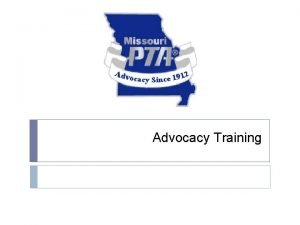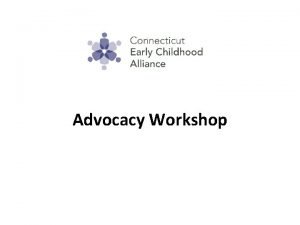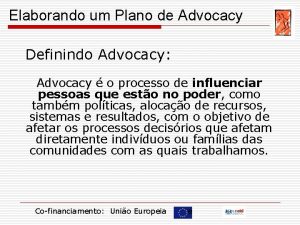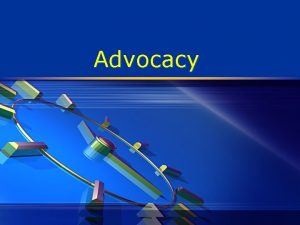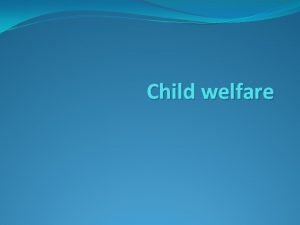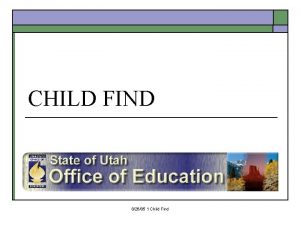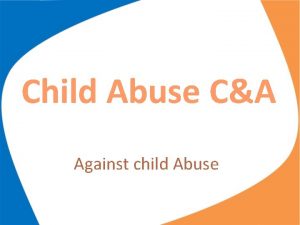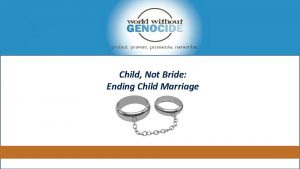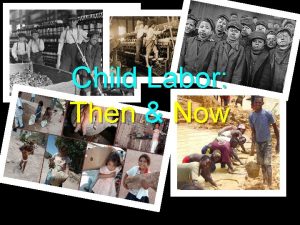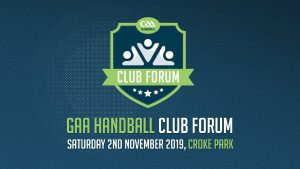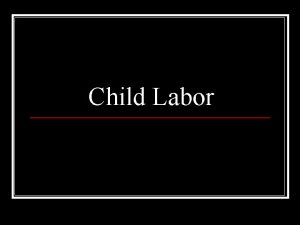Student Advocacy Child Advocacy Definition To promote the






































- Slides: 38

Student Advocacy

Child Advocacy Definition To promote the optimal development of children.

Child Advocacy Definition To protect children’s rights which may be abridged or abused in a number of areas.

Safe Harbor Students want an adult ally and a safe harbor

Student Advocacy Topics • All Students • School Climate • Academic Rigor • Career Plan • Individuals • Abused • Behavior Problems • Close the Achievement Gap

All Students Advocacy • Junior High – 1, 000 behavior referrals • Teachers – “Those Darn Kids” • Students – “Washington is Wacked” • Staff – Overwhelmed • What would you do to advocate for student to have a positive learning environment?

Chinese Proverb One bamboo doesn’t make a raft.

All Students Advocacy • Principal’s Agreement • Staff Leadership Team • Presented Data at Staff Meeting • Staff Discussion

All Students Advocacy • Cathartic • Set Goals • 25% fewer behavior referrals • 30% increase in PLE survey • School Mission Statement

Washington Mission Statement Students and staff will work together to make Washington a positive place to learn and teach.

All Students Advocacy • Outside Speaker • Follow-up • Washington Way • Monthly Themes

All Students Advocacy • Student Leadership Team • Friday DVD • Posters • Announcements • Prizes • Hallway Plan • Individual Interventions

1 out of 4 girls are sexually abused 800 students 100 sexually abused girls

Advocating for Abused Students • Classroom Presentation • DVD • Prevalence of Abuse • Not Your Fault • Repeat Perpetrators • Can Feel Better

ASCA Ethical Standards A 1 A - Has a primary obligation to the student, who is to be treated with respect as a unique individual.

Scenario • Jan, a 10 th grader, reports Abby is being sexually abused by her mom’s boyfriend • What should you do next as a student advocate?

Student Advocacy • Reassure Jan • Meet with Jan a few more times • Call Abby to office • Let her know reason for meeting • Confidentiality • Reiterate lesson points • Abby denied the abuse

Sexual Abuse Fact Approximately 97% of youth who report sexual abuse are telling the truth.

Student Advocacy • Told Abby this fact • Known situations when it wasn’t true • Mandatory Reporter • Would not report that she disclosed • Abby reported abuse • What would you do differently? • What would you do next?

Student Advocacy • Told Abby that I must report • Called Child Protection • Let Abby know what happens next • Safe • Realistic hope • CP worker arrives at school • Get Abby from class

Student Advocacy • Abby met with CP worker • Met with Abby after CP worker left • Report was unfounded • What would you do next?

ASCA Ethical Standards A 6 - Make referrals when necessary to outside resources E 1 - Function within the boundaries of individual professional competence and accept responsibility for the consequences of his/her actions

Student Advocacy • Met with Abby • Called mom to make referral • Did not follow through with referral • Met with Abby weekly • Humanistic/Solution-Focused • Meetings - bi-weekly to monthly • Academic Improvement Group

Sexual Abuse Facts • 1 out of 5 have been solicited on internet • 1 out of 6 boys are abused • 35% abused by family member • 40% by older children they know • Average is 9 years old • Most children don’t report abuse • 80% initially deny it • 81% - doing better after counseling

Personal/Social Issues n Helping students who most need us 18% Depressed, 31% Anger Problems n 30% More Cutting, 24% Presc. Drugs n 16%-75% follow through with referrals n Not therapists n Trained professionals n Better prepared to help n

Mother Teresa If you can't feed a hundred people, then feed just one.

All Students Advocacy • High School– fewest advanced classes • Test scores about district average • Third lowest rate of post-secondary • Second highest dropout rate • Lowest GPA in district • What would you do to advocate for your students?

ASCA Ethical Standards A 1 B - Is concerned with the educational, academic, career, personal and social needs and encourages the maximum development of every student.

Stress is when you wake up screaming and realize you haven’t fallen asleep yet.

All Students Advocacy • Management Agreement • Staff Leadership Team • Present Data at Staff Meeting • Set Goals • 10% increase in advance classes • Raise GPA by. 3 • 5% increase in post-secondary

Rigor Advocacy • Counselors reviewed students with advanced teachers • Standardized test scores • Teacher recommendations • Students of color • Contacted parents

Rigor Advocacy • Groups – Connect and Check • Ethnic Identity Development • Grading Period – Review grades • Use data to identify new students • What would you add, change, or delete?

Academic Advocacy • September Theme – Organization • Planner • Binder • Check Grades • Parent Night • Homeroom Challenges • Close the Achievement Gap

Academic Advocacy • Small Groups – Study Hall • Ethnic Identity Development • Grading Period – Check grades • Identify new students

Academic Advocacy • Identify staff • Individuals – Check and Connect • Positive Phone Calls • What would you add, change, or delete?

Post-Secondary Advocacy • Students of Color • Naviance in Classroom • 4 Areas • Match with • Career Plan • High School Plan • Post-Secondary Plan

Post-Secondary Advocacy • 11 th and 12 th Grade – Individual Student Planning • Parent Nights – 3 annual • Reports • Follow-up • What would you add, change or delete?

Maya Angelou People may forget what you said and did, but they will never forget how you made them feel.
 Student advocacy definition
Student advocacy definition Curriculum integration to promote student outcomes
Curriculum integration to promote student outcomes Iowa child advocacy match
Iowa child advocacy match Foothills child advocacy center
Foothills child advocacy center Lsu jonathan sanders
Lsu jonathan sanders Left child right sibling tree
Left child right sibling tree Communist manifesto
Communist manifesto Promoting services and educating customers
Promoting services and educating customers Active learning strategies to promote critical thinking
Active learning strategies to promote critical thinking Advertising bookkeeping services
Advertising bookkeeping services Enlisted evaluation report
Enlisted evaluation report What ideas did the measure contain the missouri compromise
What ideas did the measure contain the missouri compromise R051 contemporary issues in sport
R051 contemporary issues in sport How does polymorphism promote extensibility
How does polymorphism promote extensibility Implement tasks that promote reasoning and problem solving
Implement tasks that promote reasoning and problem solving Which of the following is a strategy to promote leveling?
Which of the following is a strategy to promote leveling? Your target webtoon
Your target webtoon The three r's in membership fccla
The three r's in membership fccla Active learning strategies to promote critical thinking
Active learning strategies to promote critical thinking Promote active participation
Promote active participation What is community meal
What is community meal When should you promote hipaa awareness
When should you promote hipaa awareness What is fcclas tagline
What is fcclas tagline Deeper reading kelly gallagher
Deeper reading kelly gallagher Advertising is a message designed to promote
Advertising is a message designed to promote Promote together
Promote together Protect, promote, and improve the health of all people
Protect, promote, and improve the health of all people How did the mauryan empire’s army help to promote trade?
How did the mauryan empire’s army help to promote trade? Zealous advocacy definition
Zealous advocacy definition Digital advocacy training
Digital advocacy training Your last weekend
Your last weekend What did they do last weekend
What did they do last weekend Clearinghouse student tracker
Clearinghouse student tracker Class maths student student1 class student string name
Class maths student student1 class student string name National student clearinghouse student tracker
National student clearinghouse student tracker Freckle student login
Freckle student login Teacher good morning class student
Teacher good morning class student Sls moe login
Sls moe login Hình ảnh bộ gõ cơ thể búng tay
Hình ảnh bộ gõ cơ thể búng tay



